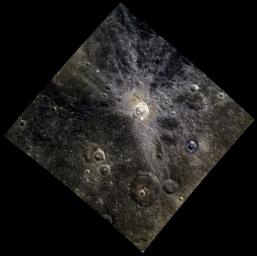We recently got a high-resolution look at Hodgkins crater. Today's featured image is a great example of how MDIS's two cameras complement each other: the NAC (narrow-angle camera) provides the high resolution and the WAC provides a lower resolution view in color. Usually the ejecta of fresh craters is relatively blue, but like Kuiper crater, Hodgkins continuous ejecta blanket is redder. In this case, it appears that Hodgkins has exposed a compositionally distinct material.
This image was acquired as a high-resolution targeted color observation. Targeted color observations are images of a small area on Mercury's surface at resolutions higher than the 1-kilometer/pixel 8-color base map. During MESSENGER's one-year primary mission, hundreds of targeted color observations were obtained. During MESSENGER's extended mission, high-resolution targeted color observations are more rare, as the 3-color base map is covering Mercury's northern hemisphere with the highest-resolution color images that are possible.
Date acquired: March 15, 2012
Image Mission Elapsed Time (MET): 240290904, 240290900, 240290896
Image ID: 1519152, 1519151, 1519150
Instrument: Wide Angle Camera (WAC) of the Mercury Dual Imaging System (MDIS)
WAC filters: 9, 7, 6 (996, 748, 433 nanometers) in red, green, and blue
Center Latitude: 28.60°
Center Longitude: 17.71° E
Resolution: 251 meters/pixel
Scale: Hodgkins crater (center) is approximately 18 km (11 miles) in diameter
Incidence Angle: 35.8°
Emission Angle: 12.6°
Phase Angle: 48.4°
The MESSENGER spacecraft is the first ever to orbit the planet Mercury, and the spacecraft's seven scientific instruments and radio science investigation are unraveling the history and evolution of the Solar System's innermost planet. Visit the Why Mercury? section of this website to learn more about the key science questions that the MESSENGER mission is addressing. During the one-year primary mission, MDIS acquired 88,746 images and extensive other data sets. MESSENGER is now in a year-long extended mission, during which plans call for the acquisition of more than 80,000 additional images to support MESSENGER's science goals.
These images are from MESSENGER, a NASA Discovery mission to conduct the first orbital study of the innermost planet, Mercury. For information regarding the use of images, see the MESSENGER image use policy.

 Planetary Data System
Planetary Data System












